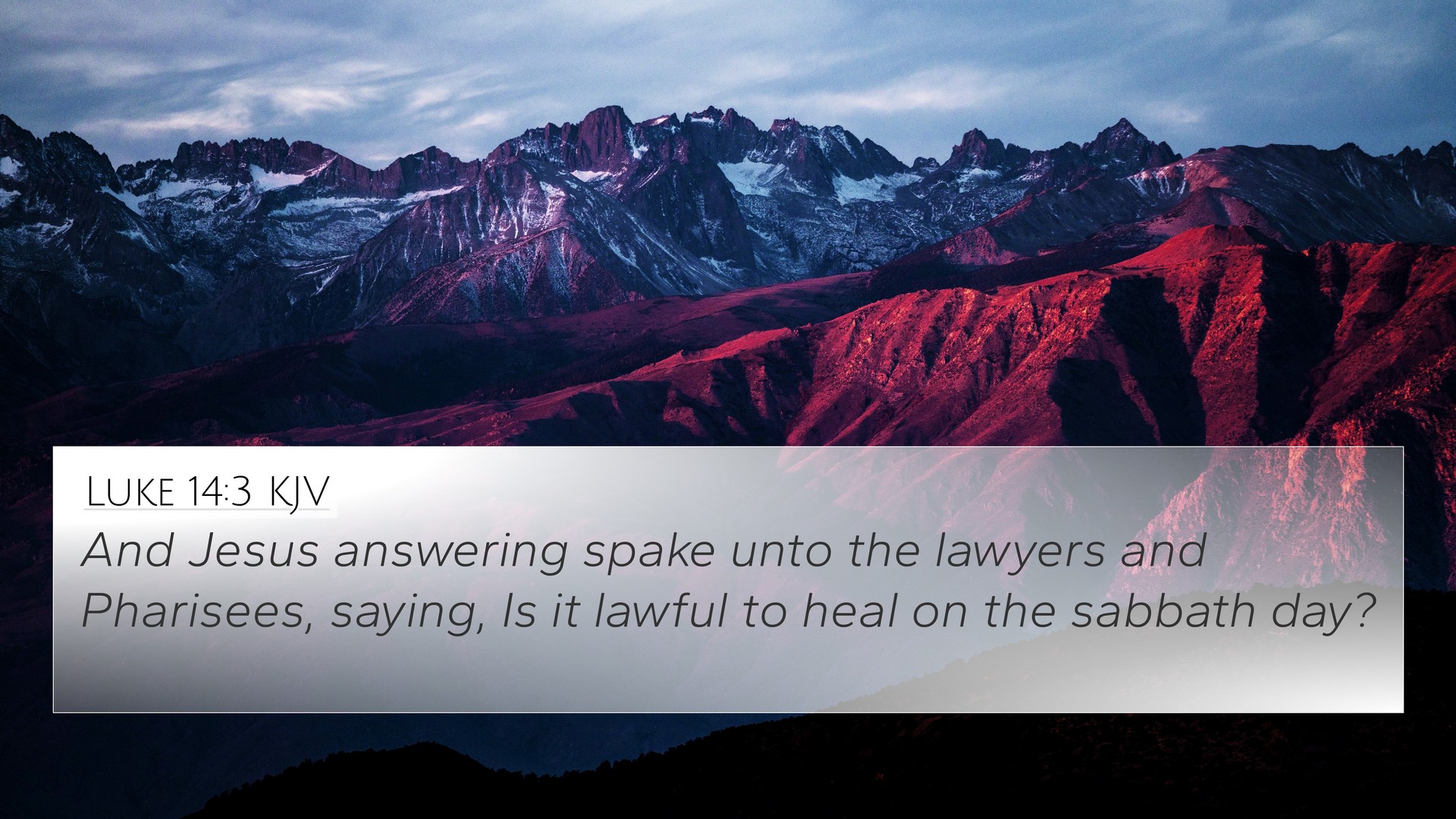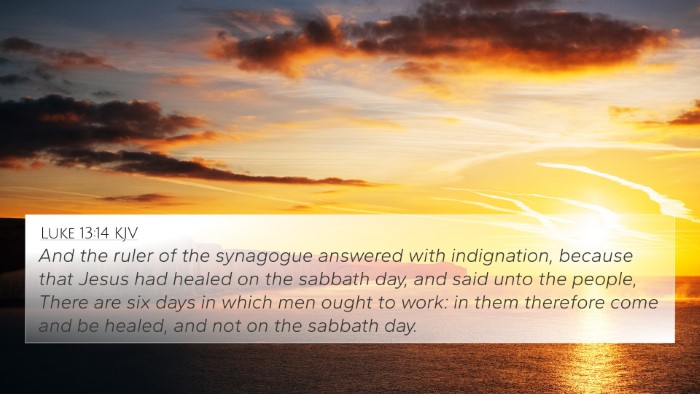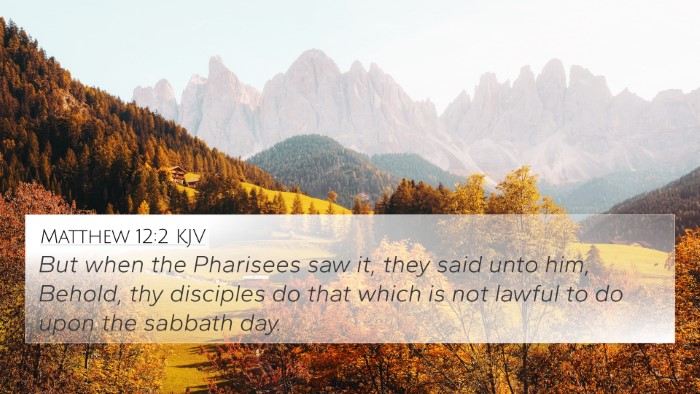Understanding Luke 14:3
Luke 14:3 states: "And Jesus answering spoke to the lawyers and Pharisees, saying, Is it lawful to heal on the sabbath day?" This verse is loaded with significance, inviting a deeper consideration of the themes of law, mercy, and the spirit of the Sabbath.
Contextual Overview
In the context of the Gospel, this verse illustrates Jesus’ constant confrontation with the religious leaders of His time. He challenges their understanding of the law through a practical situation, prompting them to reflect on the essence of mercy versus legalism.
Meaning and Interpretation
According to Matthew Henry, this question posed by Jesus serves to expose the rigidity of the Pharisees' interpretations of the Sabbath laws. Rather than focusing on the law’s intent—mercy and compassion— the Pharisees often prioritized strict adherence, even at the expense of human suffering.
Albert Barnes emphasizes that this moment highlights the contention between Jesus’ healing acts and the established Jewish tradition. He draws attention to the fact that the question of legality regarding healing on the Sabbath evokes a dialogue about the overarching purpose of the Sabbath.
Adam Clarke expands on the implications of healing on the Sabbath, noting that Jesus’ authority to heal exemplifies His divine power and emphasizes the compassionate nature of God, who prioritizes human need. Clarke suggests that the intent here is to provoke the Pharisees into reconsidering their stance and understanding of God’s will for humanity.
Thematic Connections
This verse acts as a bridge to numerous themes and scriptures within both the Old and New Testaments, showcasing connections and inter-Biblical dialogues. Below, we explore several key themes along with Bible verses that relate to Luke 14:3:
- Mercy Over Sacrifice: Hosea 6:6 - “For I desired mercy, and not sacrifice; and the knowledge of God more than burnt offerings.” This verse reflects God’s desire for mercy rather than mere ritual observance.
- The Spirit of the Law: Matthew 12:12 - “How much then is a man better than a sheep? Wherefore it is lawful to do well on the sabbath days.” This teaches that doing good is within the bounds of the law.
- Jesus as Lord of the Sabbath: Mark 2:28 - “Therefore the Son of man is Lord also of the sabbath.” This asserts Christ's authority over Sabbath observance.
- Compassion and Healing: Matthew 15:32 - “Then Jesus called his disciples unto him, and said, I have compassion on the multitude…” This echoes the theme of Jesus’ compassion for those in need.
- Legalism versus Grace: Romans 3:20 - “Therefore by the deeds of the law there shall no flesh be justified in his sight…” Paul’s words highlight the limitations of the law in terms of salvation and righteousness.
- Restoration on the Sabbath: Isaiah 58:13-14 - “If thou turn away thy foot from the sabbath, from doing thy pleasure on my holy day…” This speaks to the joy and restoration associated with observing the Sabbath as God intended.
- Healing on the Sabbath: John 5:5-9 - The healing of the man at the pool of Bethesda highlights Christ's approach to the observance of the Sabbath, focusing on healing and restoration.
Cross-References for Further Study
Engaging in cross-references can bring deeper clarity to understanding Luke 14:3. Here are some Bible verse cross-references that resonate with the themes of this verse:
- Exodus 20:8-11 - Discusses the commandment to keep the Sabbath holy.
- Leviticus 23:3 - Details on the Sabbath rest and holy convocations.
- Matthew 22:34-40 - Jesus summarizes the law in love, emphasizing the greatest commandments.
- Luke 13:10-17 - Another instance where Jesus heals on the Sabbath, reinforcing His point of compassion.
- James 2:13 - “For he shall have judgment without mercy, that hath shewed no mercy…” highlighting the importance of mercy.
Conclusion
Through the examination of Luke 14:3, we can see the importance of understanding the law in its original context. Jesus’ question to the Pharisees reveals their misunderstanding of God’s intentions regarding the Sabbath and the practice of mercy. The study of this verse particularly benefits from Bible cross-reference guides that allow us to connect the teachings of Jesus with the Old Testament laws and the broader themes of love, mercy, and compassion.
Tools for Bible Cross-Referencing
Utilizing tools for Bible cross-referencing can enhance our study and understanding of connected scriptures. Various Bible reference resources available such as concordances and online databases allow deeper exploration into thematic connections and cross-referencing methods.
Recommended Practices
For effective cross-reference Bible study:
- Identify Key Terms: Recognize important words or themes in the verse.
- Consult a Concordance: Use a Bible concordance to find related verses.
- Engage in Comparative Analysis: Study how different verses relate to one another for a more comprehensive understanding.
Ultimately, studying Luke 14:3 and its related verses encourages believers to embrace the spirit of the law and exercise compassion over mere formality, exemplifying the heart of Jesus’ ministry.










